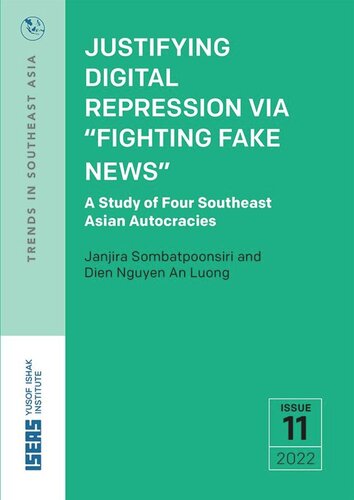

Most ebook files are in PDF format, so you can easily read them using various software such as Foxit Reader or directly on the Google Chrome browser.
Some ebook files are released by publishers in other formats such as .awz, .mobi, .epub, .fb2, etc. You may need to install specific software to read these formats on mobile/PC, such as Calibre.
Please read the tutorial at this link: https://ebookbell.com/faq
We offer FREE conversion to the popular formats you request; however, this may take some time. Therefore, right after payment, please email us, and we will try to provide the service as quickly as possible.
For some exceptional file formats or broken links (if any), please refrain from opening any disputes. Instead, email us first, and we will try to assist within a maximum of 6 hours.
EbookBell Team

4.8
44 reviewsSoutheast Asian autocracies of Cambodia, Myanmar, Thailand and Vietnam have politicized vague definitions of “fake news” to justify diverse tactics of digital repression. In these countries, what constitutes falseness in “fake news” has hardly been clearly articulated. The governments instead focus on the grave threats the dissemination of “fake news” could pose to national security, public disorder or national prestige. As the governments are vested with the power to bend the labelling of “fake news” to their will, they can criminalize those accused of circulating such information to safeguard public interests. There are at least four methods by which the governments have tightened the screws on cyberspace under the banner of curbing “fake news”: (i) prosecute Internet users, journalists and dissidents in particular; (ii) pressure Internet Service Providers and social media platforms to block and remove content; (iii) expand and deepen social media monitoring; and (iv) shut down the Internet altogether. All four countries have used “fake news” allegations to penalize critics. Cambodia, Thailand and Vietnam are inclined to use such allegations to strong-arm tech companies into removing content at the behest of the governments. Thailand and Vietnam tend to exploit such allegations to beef up online surveillance. Myanmar is the only country that turns to Internet shutdowns.The interplay between the methods of digital repression that exploit the pretext of cracking down on “fake news” and the manipulation of online discourse through the deployment of cyber troops would merit further research and in-depth examination.